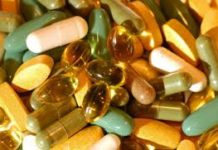Beta Carotene, a naturally occurring orange pigment found in plants such as carrots, squash, and pumpkins, is a powerful fat-soluble antioxidant that heps neutralize free radicals, prevents cancer, and fights infectious diseases. Beta carotene, referred to as provitamin A, is transformed into vitamin A in the body. This unique feature means that beta carotene is non-toxic at doses ranging as high as 500,000 iu, whereas vitamin A retinol can produce toxic effects in relatively low doses.
Adequate intake of beta carotene has been shown to help prevent Xerophthalmia (night blindness). In addition to promoting good vision, beta carotene also protects the heart and cardiovascular system, boosts immune functions, speeds recovery from respiratory infections such as colds and flu, and promotes wound healing.
Researchers are now focused on beta carotene’s impressive ability to quench singlet oxygen free radicals, leading to a greater understanding of its role in slowing down the aging process, preventing the formation of tumors, and possibly reversing the course of certain forms of cancer. A recent study presented at an American Cancer Society seminar found that beta carotene was able to reduce by half the number of precancerous mouth lesions in over 53% of test subjects diagnosed with precancerous mouth lesions.
NEW RESEARCH: Beta carotene is a nutrient found in the most abundance in yellow and dark green fruit and vegetables-foods like apricots, squash, cantaloupe, broccoli, spinach, and sweet potatoes. Its ability to prevent heart attacks came as a surprise to Dr. Charles Hennekens of Boston’s Brigham and Women’s Hospital, who was really interested in studying beta carotene’s cancer-fighting capacity. In 1990, nearly halfway through a 10-year study, Hennekens looked specifically at the data from 333 of the 22,000 men in this Physicians’ Health Study. These men were selected because they all had evidence of coronary artery disease, including angina, (the chest pain that occurs when the arteries that serve the heart are obstructed) at the start of the study.
After 6 years, 27 of the 333 men had suffered heart attacks: 10 in the group taking 50 mg (83,350 IU) of beta carotene every other day, and 17 in the group taking the placebo, representing an almost 40% lower risk for the beta carotene group. Among the men taking both beta carotene and aspirin, there were no heart attacks at all. In fact, Hennekens reported, those men taking the 50-mg dose of beta carotene had about half the number of heart attacks, strokes, cardiac arrests, or operations to open or bypass clogged arteries.1
It seems to be beta carotene’s antioxidant capacity — specifically its ability to prevent the oxidation of cholesterol — that explains its protective role in heart disease. Recent evidence has shown that cholesterol is most dangerous after it has been oxidized or damaged, thus releasing free radicals into the bloodstream, where they can damage delicate arteries. These sites of damage attract the fatty deposits that eventually clog the arteries. Free radicals may also oxidize low-density lipoprotein (LDL) cholesterol (the “bad” cholesterol), which makes the macrophages transporting the LDL turn into foam cells that form atherosclerotic plaques.













